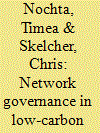| Srl | Item |
| 1 |
ID:
171504


|
|
|
|
|
| Summary/Abstract |
This article evaluates the opportunities and limitations of network governance to support low-carbon energy transitions in European cities. Network visualization and statistical measures of network structure are combined with qualitative case study data to provide a comparative analysis of energy transition networks in Birmingham, Budapest and Frankfurt. Data reveal that existing networks differ in extent, integration and distribution of authority. Contextual characteristics help explain these differences, highlighting the importance of path dependencies and disjunctions in each city. These findings represent important considerations for the Transition Management model which aims specifically at governing sustainability transitions via network governance. Responding to a gap in the literature we demonstrate that Transition Management must be considered as an intervention into locationally specific settings and existing networks. The design of network structures and processes, as well as role of any ‘transition manager’, must reflect contextual factors and existing network considerations. Failure to account for contextual differences limits the model’s capacity to contribute to sustainable energy transitions in different cities.
|
|
|
|
|
|
|
|
|
|
|
|
|
|
|
|
| 2 |
ID:
105739


|
|
|
|
|
| Publication |
2011.
|
| Summary/Abstract |
Saskatchewan, a Canadian prairie province, has recently begun to restructure the provincial energy system. The institutional, technological and social bases of the Saskatchewan power regime have been disrupted by both exogenous pressures and endogenous problems, providing an opportunity for alternative energy options to be considered as possible power alternatives. As the province addresses the long-term socio-technical transition (STR) associated with a regime change in the power sector a number of alternative energy options have been identified. Using a transition management approach, this paper argues that the path taken will depend very much on whether these alternatives can be adopted as modifications of the existing STR - leaving the key actors, institutions and relationships essentially untouched - or whether they will necessitate a wholesale reconstruction of the regime itself. In this paper we analyze how, over time, the socio-technical configurations of the energy system became very durable as existing technologies become embedded in regulatory frameworks, infrastructure, users practices and expert communities. We then consider the potential of several alternative technological trajectories and the likelihood of one of these socio technical regimes emerging in Saskatchewan.
|
|
|
|
|
|
|
|
|
|
|
|
|
|
|
|